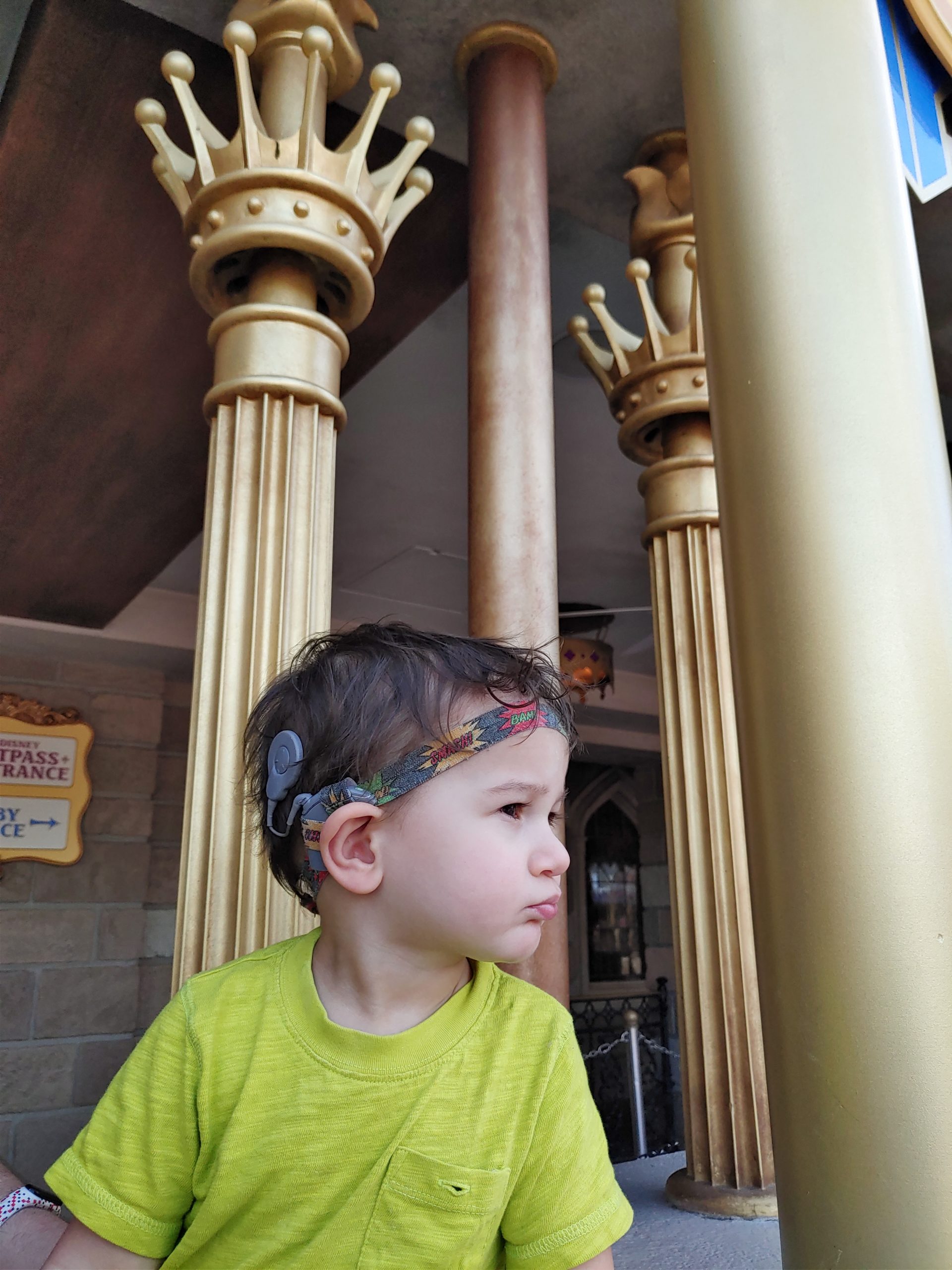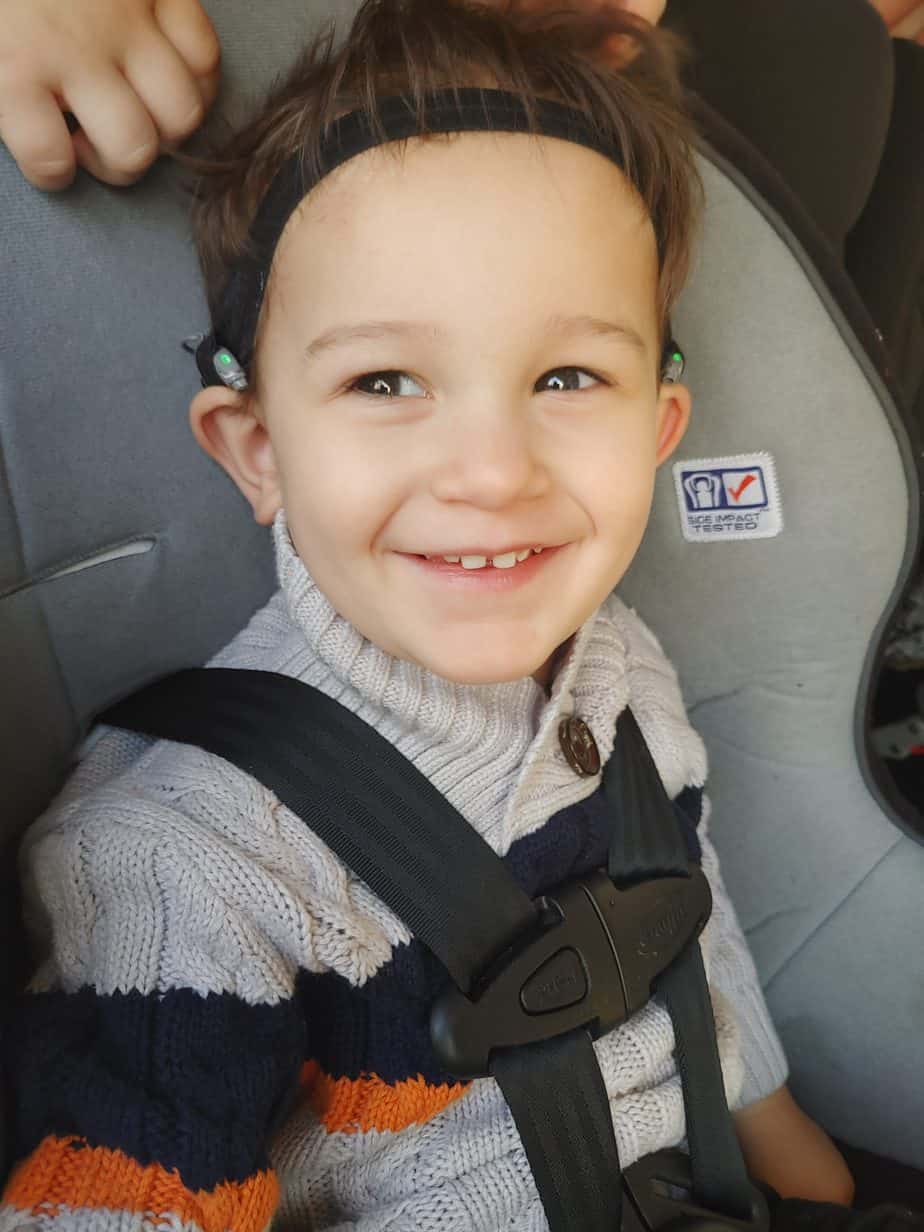After Jaxon failed his newborn hearing screening, his parents soon learned that they would need to act quickly in order for their son to enjoy a life of sound. Thanks to his Cochlear™ Nucleus® 7 Sound Processors, Jaxon isn’t missing a beat and has a special enthusiasm for the world around him.
“Our third child, Jaxon Oliver, was born on May 24, 2018. I can’t express into words the love and excitement we had for him entering into this world as our first son. I tweeted a photo saying, ‘I never thought I would have such an overwhelming feeling of love for a boy after having the girls, but wow, was I wrong!’ He was perfect in every way.
Jaxon’s birth and failed newborn hearing screening
 I kept him close throughout our three-night stay at the hospital following my c-section, only letting him out of my sight for the typical wellness check the nurses do late at night. An hour had passed when they brought him back letting me know everything went well, except for his failed newborn hearing screening.
I kept him close throughout our three-night stay at the hospital following my c-section, only letting him out of my sight for the typical wellness check the nurses do late at night. An hour had passed when they brought him back letting me know everything went well, except for his failed newborn hearing screening.
The next morning, the nurses conducted a follow-up hearing test. The results were the same – failed in both ears. The nurse came in with a referral to an audiologist to conduct a more in-depth hearing test. After the hearing results came back as ‘failed’ both times, we were told it was probably just excess fluid from his c-section that was causing a buildup. We were told it was probably nothing to worry about. On June 8, 2018, at just 2 weeks old, Jaxon had his follow up hearing test at the specialist to undergo an auditory brain response (ABR) test.
I specifically remember thinking nothing of this appointment and telling my husband he should go grocery shopping. As any baby so young would do, Jaxon laid in my arms sound asleep as the testing ran. Being somewhat familiar with decibel information, I anxiously sat there trying to analyze the computer screen as it calculated results. After realizing I was far from understanding what the information meant, I started to read the expressions on the audiologist’s face. At that point, I knew she wasn’t seeing the results we were hoping for – so I abruptly interrupted her focus and said, ‘It doesn’t look good does it?’ She responded stating that she usually waits until the second test is conducted prior to informing the parents of any news, but at this point she was not getting any auditory response.
After another hour of testing, the audiologist sat me down in another room and told us that Jaxon had bilateral sensorineural hearing loss at a profound level in both ears. In other words, he’s deaf. In that moment, I stared at my 2 week old with tears rolling down my face as the audiologist’s voice started to fade into the background. At that point I was immersed in my thoughts, angry, sad and scared not knowing what the future would hold for us, but more importantly, for Jaxon.
Exploring use of hearing aids and sign language
 From that moment on, his hearing journey moved fast. My husband and I dove in to understand our options. Right away, information on American Sign Language as well as brochures on hearing devices such as cochlear implants were introduced to us.
From that moment on, his hearing journey moved fast. My husband and I dove in to understand our options. Right away, information on American Sign Language as well as brochures on hearing devices such as cochlear implants were introduced to us.
As a hearing family, we had never met another deaf individual and the thought of learning a new language was intimidating to say the least, but not something we had ruled out. We were unfamiliar with what cochlear implants were, but the thought of this technology got us excited with the idea that it may allow him to be able to access sound one day.
Jaxon received his first pair of hearing aids shortly after, at 7 weeks old. Unfortunately, because of Jaxon’s profound hearing loss, the hearing aids gave him minimal to no sound access. At such an early stage in this process, it was still unknown if Jaxon was even a candidate for cochlear implants, so we dove right in to start learning American Sign Language as a bridge to communication and becoming his first language. It wasn’t until about 7 months of age that Jaxon underwent genetic testing for us to understand what the cause of his hearing loss was from. Through this process, we learned that his hearing loss is due to the genetic mutation, Connexin 26, that my husband and I carry and is known to be the most common cause of congenital sensorineural hearing loss.
Implanted with cochlear implants and hearing for the first time
It was around this time that Jaxon had an MRI to see if he has auditory nerves which would allow him to be a candidate for cochlear implants. The 24 hour waiting period to receive these results were one of my most anxious memories but receiving that call and hearing them saying that he was eligible was such a relief and an exciting moment.
After an immense amount of research and consultations with audiologists, cochlear implant surgeons, and in-depth discussions with other parents of children with hearing implants, we knew we wanted to proceed with this process and decided that Cochlear was the best choice. Cochlear was highly regarded, well known and had wonderful reviews on its product and customer service. Knowing that our son would have immediate response and turnaround time on any malfunctioning equipment was truly important to us.
Jaxon was scheduled to be implanted at 11 months, activated at 12 months but a couple of ear infections set him back. After receiving ear tubes in both ears, Jaxon had his bilateral implant surgery at our local hospital on June 13, 2019, just a little over a year from his initial hearing loss diagnosis. Those six hours sitting in the waiting room during his surgery were nerve-wracking, but knowing he was at the number one hospital in the country in the hands of a renowned surgeon eased our nerves. We received frequent updates throughout the whole surgery letting us know how well it was going.
Jaxon experiencing new sounds
 Since receiving his implants, Jaxon has experienced so many sounds. Some include his first-time hearing fireworks just three days after activation, splashing water while playing in the pool with his siblings using his Aqua+ kit1 and his discovery of his excitement and admiration for dancing and music. This proves we made the best decision for him.
Since receiving his implants, Jaxon has experienced so many sounds. Some include his first-time hearing fireworks just three days after activation, splashing water while playing in the pool with his siblings using his Aqua+ kit1 and his discovery of his excitement and admiration for dancing and music. This proves we made the best decision for him.
Jaxon is now 34 months and is proceeding with his transition into preschool come Fall of 2021. We plan on him attending a deaf and hard of hearing school who specializes in speech and language communication in children with hearing devices such as cochlear implants. With ongoing speech therapy sessions, a strong foundation in sign language support and the amazing technology and the daily use of his Nucleus 7 Sound Processors, exciting things are to come for him.
Social media platforms have given me the opportunity to connect with other families going through similar journeys and it’s been such a great resource. I am so happy to have connected with so many families and hope to connect with more. You can follow Jaxon’s journey and connect with me on Instagram2 at @aliciacbernardo.”
Did your child fail the newborn hearing screening? Are you looking into options for them to have access to sound? Learn more here.
- The Nucleus 7 Sound Processor with Aqua+ is water resistant to level IP68 of the International Standard IEC60529. This water protection means that the sound processor with the Aqua+ can be continuously submerged under water to a depth of 3 meters (9 ft and 9 in) for up to 2 hours. This water protection only applies when you use a Cochlear Standard Rechargeable Battery Module or Cochlear Compact Rechargeable Battery Module. The Nucleus 7 Sound Processor is water-resistant to level IP57 of the International Standard IEC60529 without the Aqua+ accessory for the Nucleus 7 Sound Processor.
- © 2021 INSTAGRAM
